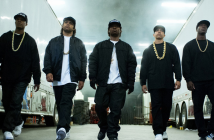
Best Film of the Year: Mad Max: Fury Road
As alliances are formed, characters die in spectacularly orchestrated fashion, and rig after rig crashes, burns, and blows up in stunning visual glamour, be prepared to buckle up and hold on tight; and when the action quells, meaningful dialogue is shared and innocent deaths are beautifully presented, brace yourself for some surprising waves of emotion. Mad Max: Fury Road is truly a work of art. The visual effects are nothing short of phenomenal, and for a film with surprisingly little dialogue, it retains the audience’s interest absolutely, and maintains a clear narrative from start to finish.
Next Projection’s Top Ten Films of 2015

Worst Film of the Year: Jupiter Ascending
Returning to Jupiter Ascending, there is a lot to like here, despite itself. The world that the Wachowski’s built is impressive and there are many stories that could be told in this universe that would be very interesting and entertaining. It’s a shame they didn’t make a movie out of one of those stories or aspects, though because the way things are looking for this picture, a sequel is almost certainly out of the question, let alone an entire series.
Runners Up: Beeba Boys, Fantastic Four

Best Foreign-Language: The Assassin
Hou’s camera is perfectly observational, with the kind of stoic point of view one might imagine of nature. Each shot is perfectly imbued with Hou’s personal touch; every shot is true to his vision. What is only missing from Hou’s expression, which is found in most of his other films, is a sense of personal relation or nostalgia. Films such as A Time to Live and a Time to Die and Goodbye, South, Goodbye are strikingly human, modern, and touching, while The Assassin’s place in history prevents the film from feeling intertwined with one’s personal experience. But perhaps this is not important, as the film’s lasting vision and genuine world might soon envelope the viewer as if it were their own.
Runners Up: The Look of Silence, Hard to Be a God

Best Director: George Miller for Mad Max: Fury Road
The truly novel thing about Mad Max: Fury Road isn’t the way Miller brilliantly melds action and character development, though. It’s that Miller made a film with a woman as a lead that wasn’t sexualized or demeaned but was a person who was strong and vulnerable, and that the major plot was freeing objectified and abused women from their male oppressor.
Runners Up: Todd Haynes for Carol, Alejandro Gonzalez-Innaritu for The Revenant

Best Actor: Leonardo DiCaprio for The Revenant
The film is based on the 2002 novel The Revenant by Michael Punke which, in turn, was inspired by true events of 19th century Hugh Glass, a trapper who, after being mauled by a bear and left for dead by his men, struggles solo through the unforgiving wilderness to enact his revenge. Glass is brought ferociously to life by a nearly indescribably committed Leonardo DiCaprio, who carries the film and from whom you cannot look away, no matter what gore or violence is unfolding onscreen. It is an astounding performance that deserves all the murmurs that came before the film’s release, as well as the continued chatter and buzz now that the film is in theatres. It is, if not the best performance of his career, near the very top.
Runners Up: Michael Fassbender for Steve Jobs, Samuel L. Jackson for The Hateful Eight

Best Actress: Charlize Theron for Mad Max: Fury Road
Although Max is the protagonist, Furiosa is the more overtly multi-dimensional character, at once fierce, unforgiving and determined, while also compassionate, gentle and hopeful. It is this final characteristic that divided Max and Furiosa the most, as he bluntly states there is no point in hope; but later we finally get to see the gentle side of Max as he moves determinedly to save a friend. Hardy, Theron, Hoult and Keays-Byrne give powerful performances, and bring to life their uniquely dimensioned characters.
Runners Up: Cate Blanchett for Carol, Charlotte Rampling for 45 Years

Best Cinematography: Roger Deakins for Sicario & Edward Lachman for Carol (tie)
You might say we’re at peak Roger Deakins, the cinematographer so storied and decorated it’s hard to watch any of his films without an utter fascination at the camerawork. But that simply isn’t true; Sicario, his new collaboration with Denis Villeneuve, is yet another example of the extraordinary abilities of the artful cinematographer. There’s a moment in Sicario when, as night falls over Mexican-American border, the blackened outlines of ten or so federal agents disappear below the horizon, exiting the orange, purple and black skyline until the last figure disappears, night vision goggles at all. The camera (steady, but still visibly moving with the figures) traces their strides until suddenly, we’re left with only the darkened hues of the last ounces of dusk. Heart pounding, mouth dry, it’s an embarrassingly gorgeous thirty-second sequence within an astounding two-hour assault on the senses, the film begging audiences everywhere to mainline a cocktail of adrenaline, anticipation, and fear.
If Deakins’s work this year had an equal, it was surely that of Edward Lachman, who photographed the astounding Todd Haynes picture Carol. Sporting the soft touch which only 16mm stock can seem to provide, Lachman often shoots the story in the least obvious way, holding back on seemingly important details until the audience truly begs to be let in on the secret. The camera is infatuated with hands and the role they play in a burgeoning relationship, but particularly a relationship so forbidden, in public or in private. This is the 1950s, and for those who wish to love someone of the same gender, hands are perhaps the only way to show it.
Runners Up: John Seale for Mad Max: Fury Road

Best Supporting Actor: Mark Rylance for Bridge of Spies
Mark Rylance has risen to the top with his scene-strealing role in Steven Spielberg’s Bridge of Spies. His performance as Soviet spy Rudolf Abel is the story’s, and therefore the film’s, reason for being, and he feels like the soul of the film, even if the performance is rather quiet and unassuming.
Runners Up: Sylvestor Stallone for Creed, Oscar Isaac for Ex Machina

Best Supporting Actress: Alicia Vikander for Ex Machina
Ex Machina works so well because it’s more than just a sci-fi film. It fits into multiple categories: thriller, mystery, comedy, talkie narrative, romance and other blends. With the mystery come equal parts of wonder. The world building that takes place is fascinating to watch unfold. The audience is given just enough to ease into the world, making everything at Nathan’s estate that much more believable. The film is nothing without three outstanding performances from Isaac, Gleeson and Vikander.
Runners Up: Kristen Stewart for Clouds of Sils Maria, Katherine Waterston for Queen of Earth

Best Youth Performance: Jacob Tremblay for Room
Whatever awards recognition Room receives will be well deserved, but awards recognition, not to mention the usual arsenal of superlatives available to critics and reviewers, can only approximate (badly, if we’re being honest) what Abrahamson, Donoghue, Larson, and Tremblay accomplished with Room. As Jack, Jacob Tremblay gives an unexpectedly restrained, even subtle performance, remarkably free of the mannerisms and affectations all too typical of child actors.
Runners Up: Abraham Attah for Beasts of No Nation, Gunes Sensoy for Mustang

Best Animated: Inside Out
The thing about Inside Out is that it takes an extremely complicated subject like emotions and emotional development and maturity and boils it down to basics. Some of the loftier concepts won’t be understood by the youngest viewers, but that doesn’t matter. Inside Out is not only entertaining but it digs deeper in a successful attempt to show the inner workings of our minds and the evolution of emotions and emotional understanding. Inside Out shows that Pixar may have stumbled in recent years but they can regain their balance and make an amazing, noteworthy and important film that also entertain anyone and everyone who watches it.
Runners Up: Shaun the Sheep Movie, Anomalisa

Best Comedy: Mistress America
Mistress America won’t do anything to convince Baumbach’s detractors to reevaluate their opinion of his oeuvre. Frances Ha, Mistress America is practically in its own alternate universe, but with enough calculated differences to suggest we’re watching events unfold in a sidereal, Woody Allen-inspired universe where the central characters, hyper-smart, ultra-verbose, but as always, lacking the crucial element of self-awareness.
Runners Up: What We Do in the Shadows, Trainwreck

Best Romance: Carol
With Carol, Haynes offers a stunning, very detailed period piece of an innocent, realistic and touching romance of two people who have to overcome many obstacles not only to be together but to express their true feelings and be who they are in a society during the 1950s that is intolerant and discriminating against homosexuals. Carol is an intelligent film with daring and complex characters whose great love and attraction for one another cannot and should not be denied. Mara and Blanchett in particular deliver brilliant performances, especially through their longing gazes and their convincing connection between each other.
Runners Up: Brooklyn, I’ll See You in My Dreams

Best Horror: It Follows
It’s that sense of existential dread, aided immeasurably by a talented cast giving grounded, naturalistic performances (a rarity where teen-oriented horror films are involved), that truly makes It Follows stand out among other, typically dispensable entries in the horror genre.
Runners Up: Goodnight Mommy, Crimson Peak

Best Action: Mad Max: Fury Road
The first half-hour of the film is essentially a chase, with an assortment of cars, trucks, motorcycles, and crazed War Boys wildly shooting flame throwers, lobbing hand grenades, and jumping, like pirates, from one vehicle to the next. The extended sequence is beautifully filmed and exciting to watch. Director George Miller knows how to tell his simple story in visual terms, downplaying dialogue for fear of bogging down the picture’s rocket-like pace.
Runners Up: Mission: Impossible - Rogue Nation, Sicario

Best Science Fiction: Ex Machina
Gauging the strength of a film involves many factors that depend greatly on the type of film you’re watching. Does it entertain? Is it thought provoking? Does it engage you? Do you have a difficult time suspending disbelief? Is it timeless? The list goes on, and for sci-fi films, cinema lovers tend to be tougher on these films. Other ideas that factor in the enjoyment of a sci-fi film: Is it Original? Is it scientifically accurate? (Queue the 100 things wrong with Interstellar think pieces) Alex Garland (Writer/Director) takes these factors and orchestrates them to craft one of the finest sci-fi films of our time.
Runners Up: Star Wars: The Force Awakens, Mad Max: Fury Road

Best Documentary: The Look of Silence
The Look of Silence is cinematically beautiful. The close ups and the simple village life shots are deeply saturated in natural lighting and colour, giving a paradise contextualisation of the natural beauty of Indonesia. All the time, this only reinforces the genuinely bizarre happening of the genocide and what seems to be an otherwise peaceful village lifestyle.
Runners Up: Approaching the Elephant, Innocence of Memories

Best Score: Carter Burwell for Carol
Despite decades of scoring films, most notably the majority of features from the Coen Brothers, Carter Burwell’s mystical, string-driven accompaniment to Carol has resulted in his first Academy Award nomination. Having previously provided the score for director Todd Haynes’s Velvet Goldmine and Mildred Pierce, Burwell understood what was necessary in working on one of 2015’s finest films. Having an ethereal quality which pairs harmoniously with the softness of Edward Lachman’s 16mm camerawork, Burwell’s score accentuates the longing in each glance between our two leading women. Unable to act on their most desired impulses, the music gradually builds to the few moments of emotional release, capturing both the essence of this forbidden relationship as well as the timidity in finding new love.
Runners Up: Ennio Morricone for The Hateful Eight, Junkie XL for Mad Max: Fury Road



